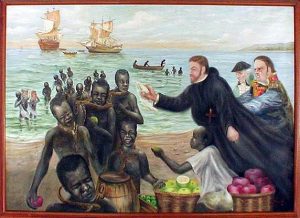HOMILY WEEK 23 03 – Year II
Living the Beatitudes:
Optional Memorial of St. Peter Claver
(1 Cor 7; Ps 45; Lk 6:20-26)
*********************************************
The Beatitudes are the Magna Carta of Jesus’ teaching. Part of the Sermon on the Mount in both Matthew and Luke, they present Christ as the new Moses, building on the Ten Commandments of the first Moses on Mt. Sinai.
Unlike the Beatitudes in Matthew, Luke complicates them with blessings and woes. Both deal with basic attitudes towards life.
An attitude can be defined as our habitual way of thinking, feeling and acting in the world. The Returning to Spirit (RTS) program developed by Algonquin facilitator Marc Pizandewatc speaks of our Way of Being. He is also talking about our basic attitude.
One priest’s Way of Being was “Mr. Fix-it.” That tendency to control and fix people was not helping him in his ministry, causing frustration as people resisted his efforts to change them. One woman’s Way Of Being was “Drama Queen.” She resisted that loudly when others applied that attitude to her at an RTS training session, but eventually she calmed down, accepted it and was set free to heal with the part of that attitude that was not helping her in her work either.
The Beatitudes are the polar opposite of the temptations that Jesus faced in the desert after his baptism in the Jordan – possessions, pleasure, prestige and power. Living the Beatitudes can set us apart from a world that so easily succumbs to these same temptations that the Chosen People fell prey to throughout their history.
Sometimes, to grasp more deeply what we are so familiar with, it helps if we look at it from a different perspective. To that end, I was inspired to compose the Beatitudes in reverse. Here is the result:
Unhappy are the proud in spirit, theirs is a lonely world.
Unhappy the aggressive, they will lose what they thought they had.
Unhappy those who stuff their feelings and never cry, they shall live in numbness.
Unhappy are the unjust and unfair, they will never be satisfied.
Unhappy are the merciless; they will never experience mercy.
Unhappy the impure and lustful; they shall never see God.
Unhappy those who cause dissension; they will be called children of darkness.
Unhappy those who persecute others and pretend all is well; there is a lonely world.
Hopefully, hearing these Beatitudes in reverse, can help us appreciate the content of the Beatitudes Jesus gave us in his Sermon on the Mt, and integrate that into our lives.

St Peter Claver
We have a great example of someone living the Beatitudes in Saint Peter Claver, whom the church honours today. He was born near Barcelona, Spain, in 1580 and joined the Jesuits in 1600. Inspired by St. Alphonsus Rodriguez, Peter was sent to Cartegena in South America, then the centre of the slave trade. There, Peter tended to newly arrived African slaves with food, water and medicine.
Fr. Gerry LeStrat OMI has been to Cartegena where he saw the huge cement platform where the African slaves landed. They were taken to row upon row of concrete pens, just like cattle. What is especially tragic is that for the most part, the slave traders were Christians, probably Catholic, who found it, like the Pharisees, not that difficult to justify themselves in their dark activity.
Peter Claver would go to this area, force his way through this teeming, suffering humanity to find the sick and minister to them. He would find them on mats of broken pottery and bricks, and clothe those who were naked. Here is a quote from his writings:
“This is how we spoke to them, not with words but with our hands and our actions. And in fact, convinced as they were that they had been brought here to be eaten, any other language would have proved utterly useless. The we sat, or rather knelt, beside them and bathed their faces and bodies with wine. We made every effort to encourage them with friendly gestures and displayed in their presence the emotions that somehow naturally tend to hearten the sick.”
For nearly 40 years, he ministered tirelessly to the slaves, lobbied on their behalf and pleaded for more humane treatment for them. In 1654, ill and neglected by his religious brothers, Peter Claver died. He was canonized in 1888. He is a patron of Colombia and of all missions to black people.
The Eucharist that we celebrate now is our food for our healing journey, empowering us to live out the Beatitudes as best we can, wherever the Spirit will take us in the future.



